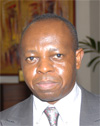Voices from the Sylff Community
Mr. YOHEI SASAKAWA, chairman of The Nippon Foundation,
Mr. HIDEKI KATO, chairman of the Tokyo Foundation,
Dear Guests,
Before saying a few words, I would like to thank The Nippon Foundation and the Tokyo foundation for all efforts they have made to make this ceremony possible, in spite of busy agenda of the chairmen and many of their members.
Mr. Chairmen,
The visit of Mr. Yohei Sasakawa in my country RDC, in last November as WHO Goodwill Ambassador for Leprosy Elimination, was for me an opportunity to recall to my mind the philosophy of SYLFF saying that "the world is one family, and all mankind are brothers and sisters".
I would let myself be inspired by this philosophy and the testimony and the personal commitment of the leaders of the foundation. I am convinced, that to be worthy of the SYLFF Prize, all former students must put in the heart of their preoccupations (research or activities), a commitment for all men and women, and for the whole human being, in collaboration with others in order to make our world a better place for humankind.
It is the sense that I wish to give today to the SYLFF Prize that you’ve given to me. I wish it is the recognition and the expression of my engagement to participate with others in the construction of an interdependent world, worthy of the human dignity.
I, therefore, take today's ceremony as an opportunity , to thank the selection committee to for choosing me as the laureate of 2007. I would like to assure you that this will be for me an engagement to make again better in the future.
Mr. Chairmen,
Receiving this Prize, I do not consider this honor being only mine. I would suggest that you become aware, while giving me this prize, that it is given to thousands of people, that beyond the geographical borders, political opinions, religious and ethnic groups and cultural backgrounds, are engaged with myself in facing economic, social, political, religious and cultural challenges of my country, of a society where people long for peace, solidarity and development, but still confront with multiform crises. It is in their name, that I humbly accept this prize.
Mr. Chairmen, Dear guests,
I am proud of having had the privilege to study in my post university degree with the support of the Ryoichi Sasakawa Young Leaders Fellowship Fund.
Since then, I learned that this privilege was a call for more commitment. I learned that I was called to exercise in my milieu a strong sense of responsibility, leadership and passion for addressing problems that handicap a full and peaceful life in society.
I learned that the grant I was receiving should enable me, not only to get a degree, but in priority to promote Peace, reconciliation, peaceful coexistence, friendship and solidarity between people and nations. I learned that this work which is carried on locally should be open to the whole world.
I finally learned that the real peace goes beyond the end of the war. It can only be reached when all human beings associate with each other, when our civilization solves the problem of access to the all fundamental needs, such as food, house, health and education.
Today I am again convinced that this is only possible if we, human beings, realize that we are interdependent and we keep an interest in what is going on on our planet. It is in that spirit that everyday I try to mobilize people, means, and energies to work for the advent of the peace in my country DRC.
Mr. Chairmen,
These last 10 years, my country DRC faces two wars, which destroyed more than 5,000,000 of lives. During all this time we’ve been very active in the efforts to bring peace in DRC, but especially we have worked in promoting and protecting human rights as the way to peace.
In DRC, peace means very concrete things: such as political agreement, end of the war, demobilization of the militias, elections, security, protection of children, end of abuse of women, humanitarian challenge and development.
Our manner to contribute to this fragile process was to invest in protecting human rights, civic education, education to citizenship, and popular participation. And finally to give a chance to the first free election in DRC in more than 40 years, I had the chance to coordinate, more than 100,000 Congolese observers and 200 from Africa, Europe and America for the last elections.
But as it is known, elections do not always mean democracy. The way forward remains a challenge. After 32 years of dictatorship and 10 years of war, my country is to be rebuilt.
The prize that I receive today is therefore another call for me to commit in this new field. I wish that this recognition is also a promise from your foundations to come with us in this area.
We ask precisely that you can help our Center of study to reinforce its capacities of research and actions in order to train people who will carry the vision to build an interdependent world where men and women are brothers and sisters and are committed for the good of all the humanity.
Finally, following the last visit of Mr. YOHEI SASAKAWA in DRC, the organizations that I coordinate, wish to locally sustain the campaign on leprosy in order to make grow the awareness of our people on this question and provoke a political will in this sector.
I wish therefore that receiving this prize becomes a beginning of a strong collaboration and a multiform engagement of your foundations and DRC.
To conclude, I want to inform that the entire amount of this prize will be dedicated to pay school fees of 50 orphan children. Parents of 33 of them died of AIDS and parents of the other 17 have been murdered during the conflict.
Thank you very much.
